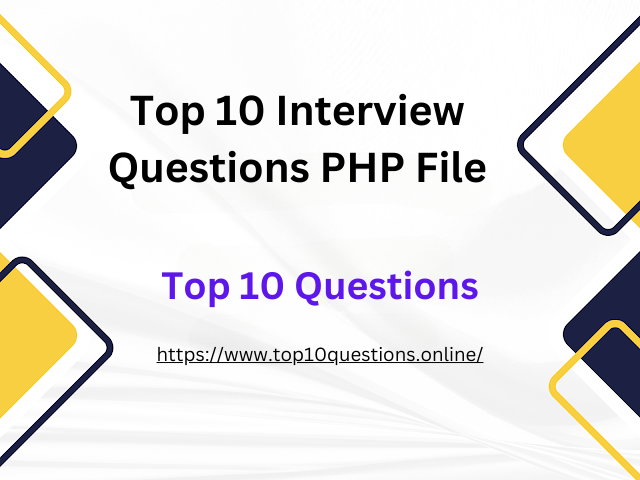Top 10 Interview Questions PHP File
Mastering PHP: Top 10 Interview Questions Answered
Whether you're a seasoned developer or a newbie to the world of programming, PHP is one language you're likely to encounter. Known for its flexibility and power, PHP is extensively used for server-side web development. As you prepare for your next interview, having a solid grasp of PHP-related questions can give you the edge you need. Here are the top 10 PHP interview questions, each answered in detail.
1. What is PHP?
PHP, or Hypertext Preprocessor, is a popular open-source, server-side scripting language. It's predominantly used for web development to create dynamic web pages. PHP scripts are executed on the server and the result is returned to the browser in plain HTML.
2. How does PHP handle forms?
PHP handles forms through its superglobal arrays (`$GET`, `$POST`, `$REQUEST`, and `$FILES`). When a user submits a form, PHP collects the data and makes it accessible through these superglobals. `$GET` is used to collect data from a form with method="get", while `$POST` is used for method="post".
3. How can you maintain a session in PHP?
Sessions in PHP are a way to store information (in variables) to be used across multiple pages. You can start a new session or continue an existing one using the `session_start()` function. Session variables are stored in the `$_SESSION` superglobal array and remain available as long as the browser is open or until they are explicitly removed or the session is destroyed.
4. What is the difference between "echo" and "print" in PHP?
Both "echo" and "print" are used to output data to the screen. The primary difference is that "echo" has no return value while "print" returns 1. Additionally, "echo" can take multiple parameters, while "print" can take one argument.
5. How can error reporting be handled in PHP?
PHP provides several error reporting functions that can be used to handle errors and control error messages' display. The `error_reporting()` function sets the error_reporting directive at runtime and can enable or disable different types of errors. `ini_set('display_errors', '1')` can be used to display errors, while `ini_set('display_errors', '0')` can be used to hide them.
6. What are PHP Filters?
PHP filters are used to validate and sanitize external input. This is important for security, as it helps to prevent script injection and can ensure that data is of the correct type and format before being used. PHP provides many filter functions, such as `filter_var()`, `filter_var_array()`, `filter_input()`, and `filter_input_array()`.
7. What is PDO in PHP?
PDO (PHP Data Objects) is a database access layer providing a uniform method of access to multiple databases. It doesn't rewrite SQL or emulate missing features but offers a consistent interface for all supported databases. PDO allows developers to safely inject foreign input (like IDs) into queries without risking SQL injection attacks.
8. How can you increase the execution time of a PHP script?
The `set_time_limit()` function in PHP can be used to change the maximum execution time of a script. By default, the limit is 30 seconds. Passing `set_time_limit(0)` removes any time limits, allowing the script to run indefinitely. However, this should be used with caution as long-running scripts can consume a lot of resources.
9. What are Magic Methods in PHP?
Magic Methods in PHP are special functions that are automatically called when certain actions are performed on objects. They always start with "". Some examples include `construct()`, `destruct()`, `get()`, `set()`, `call()`, and `__toString()`.
10. How can you prevent SQL Injection in PHP?
SQL Injection attacks can be prevented in PHP by using prepared statements, either with the mysqli or PDO extension. Prepared statements ensure that an SQL query is separated from the data it operates on, eliminating the risk of the data interfering with the query structure. Also, using the `htmlspecialchars()` function can prevent attackers from injecting HTML or JavaScript code.
